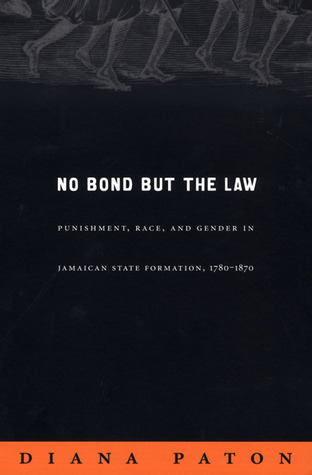
| Title | : | No Bond but the Law: Punishment, Race, and Gender in Jamaican State Formation, 1780-1870 |
| Author | : | |
| Rating | : | |
| ISBN | : | 0822333988 |
| ISBN-10 | : | 9780822333982 |
| Language | : | English |
| Format Type | : | Paperback |
| Number of Pages | : | 312 |
| Publication | : | First published October 29, 2004 |
No Bond but the Law: Punishment, Race, and Gender in Jamaican State Formation, 1780-1870 Reviews
-

Diana Paton uses an analysis of imperial-level decisions and Jamaica-specificities within a framework that emphasizes comparisons and connections between and among development in Jamaica and elsewhere. Paton uses Jamaica as a case study. She says Jamaica is unique because of its influence in and out of the British empire. The time period for the book focuses on the late 18th century beginning with the amelioration period of slavery which coincides with the first wave of major prison building ending with the second post-emancipation reconstruction of the Jamaican state.
Paton’s central point is to show the evolving shape of the penal practice in Jamaica, and how it was a circulation of trans-Atlantic intellectual ideas, the political world, and the intricate societal, economic, and political struggles that took place among the enslaved, freed people, planters, and representatives of the imperial state. Gender is one of the central categories of analysis. Paton’s work is a cultural, social, and political history with legal material as the base for her primary sources.
She shows that the relationship between wages, prisons, and whips was complex. By focusing on punishment in the transition from slavery to emancipation, Paton says she forces scholars to distinguish between the ruling classes' attempts of domination and those that actually worked. She moves away from the sharp dichotomy between slavery and post-slave societies to show that there was a long and intimate relationship between state formation and private punishment.
Previously historians have examined slavery or emancipation but not both. Her method of examining pre and post-emancipation society allows readers to see the continuation of whipping being carried out by the state authority, slavery depending on prisons and slaveholders' direct use of imprisonment. Many of her examples throughout the book use female voices, which is a part of her main contribution, showing gender differences. No Bond but Law is a bit dense but a very enjoyable read. It provides a lot for readers to think about and meditate on. I highly recommend it. -

If you want to learn about Jamaican history this is a must read!







